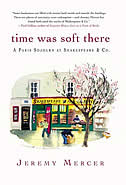 The premise is a simple one, the execution is magic. A young man on the run from himself and some nasty criminals in his hometown stumbles upon a legendary temple to the book on the banks of the Seine. Time was Soft There: A Paris Sojourn at Shakespeare & Co. details Jeremy Mercer’s time as a resident at Shakespeare & Co. The infamous bookstore and its eccentric denizens offered him sanctuary, just another of the many thousands of displaced writers who found refuge there over the decades.
The premise is a simple one, the execution is magic. A young man on the run from himself and some nasty criminals in his hometown stumbles upon a legendary temple to the book on the banks of the Seine. Time was Soft There: A Paris Sojourn at Shakespeare & Co. details Jeremy Mercer’s time as a resident at Shakespeare & Co. The infamous bookstore and its eccentric denizens offered him sanctuary, just another of the many thousands of displaced writers who found refuge there over the decades.While Time was Soft There is Mercer’s story of self-discovery, on a broader scale it is also the story of George Whitman, who ran his bookstore with a focus on equality rather than capitalism and made money only because it was necessary to keep Shakespeare & Co. operational. Beds were tucked into every bit of space in the building, piles of francs were hidden behind books on the shelves, and Whitman instituted a rule that all his refugees must help out in the store. Whitman’s other stipulations were simple; refugees had to read a book a day from the 10,000 volume store library, be up each day before the store opened, and write a short autobiography to gain access to one of the beds. The result was that thousands of luminaries of the written word found refuge among the books of Shakespeare & Co., earning the bookstore a place in most tourist guides to Paris.
At its core, this book is a loving tribute to Shakespeare & Co., illustrating the depth of influence that independent bookstores can enact on our culture. In this day of major chains and big box stores, Time was Soft There stands as a powerful homage to a sadly disappearing breed.
For many a bibliophile, a visit to the homes of famous writers generates a feeling of awe. For me, the true moments of bibliophilic “a-ha” comes only when in the hallowed halls of a truly legendary bookstore: a place where writers gathered, drank, smoked, gave readings and shared ideas. A place like Shakespeare & Co. or City Lights Bookstore (Shakespeare & Co.’s San Francisco sister store), nurturer of generations of authors. A place where bibliophiles can go, take a deep breath and say thank you. Mercer has captured the Shakespeare & Co. that 99% of us are unable to experience, that the many tourists (who only step through the door so they can check it off a “must see” list) will never understand.
Mercer’s work took me on a journey of rediscovery to my 20 year-old self, who made a pilgrimage to City Lights Bookstore, to stand where many of my Beat Generation heroes had hung out and to buy copies of their works at the source. I no longer know where my copy of Howl by Allen Ginsberg has gone. However, I have regained that moment of awe and for this, I thank Mercer. No matter what the future brings for Shakespeare & Co., Jeremy Mercy has ensured that the spirit of this amazing institution lives on.
See the review as it appears at Armchair Interviews - Time was Soft There.


No comments:
Post a Comment